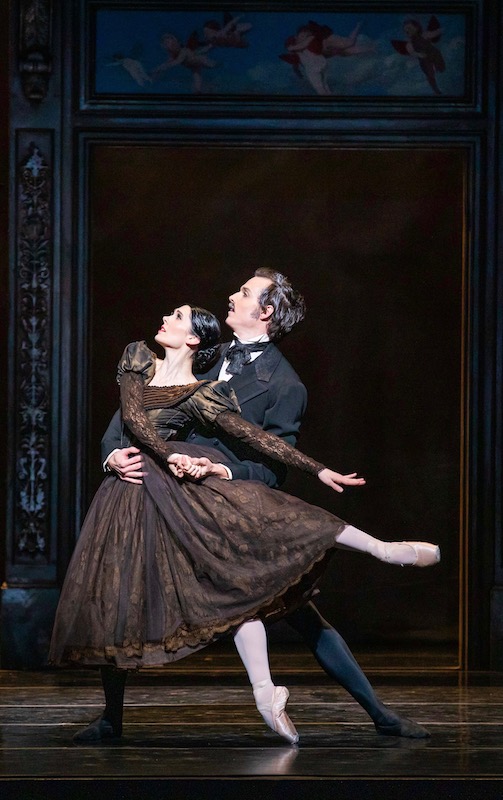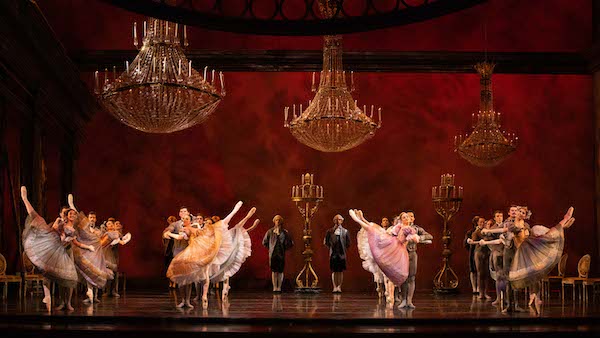Poetry on pointe: Ballet West presents a powerful, heart-rending “Onegin”

Beckanne Sisk and Chase O’Connell in Ballet West’s “Onegin.” Photo: Beau Pears
Classic ballet stories tend to be one-dimensional. There is a prince in search of his true love. He will meet her in the first act and each will be star-struck by the other. Their goal, to be together for eternity, will hit some snags because of a witch or sorcerer. They will overcome this obstacle and be together, even if in death.
Onegin is not that kind of ballet.
Ballet West’s artistic director, Adam Sklute, uses his spring performance slot to balance the season with something a little more modern, two or three shorter pieces usually filling the evening.
So it was an exciting, and welcome change, to finally get Onegin, a full-length 20th-century ballet, which Ballet West performed Saturday night at the Eccles Theater. The ballet runs through April 13.
South African-born choreographer John Cranko created Onegin for the Stuttgart Ballet in 1965 while serving as the company’s ballet director. He adapted the story from the verse novel, Eugene Onegin, by Russian poet Alexander Pushkin. The story, first published in its entirety in 1833, is a national treasure in Russia–studied, memorized and recited by school children–and was immortalized by Tchaikovsky in his most popular opera, Eugene Onegin.
The story opens at a country estate. The young poet Lensky arrives to see his fiancé Olga. He has brought along his friend Onegin, who is tired of the city and looking for some new diversion. Tatiana, Olga’s sister, falls immediately in love with Onegin. She declares her love for him in a letter only to be humiliated when he tears it up in her hands.
In Act III the story jumps decades ahead. Onegin, now older and less self-assured, attends a royal ball only to find that the hostess is none other than Tatiana. Onegin is overcome with grief when he finds Tatiana is married. She is torn between her old love and her new life but, in the end, she rejects Onegin as unequivocally as he did her years earlier.
For the ballet’s music, Cranko selected a number of piano pieces by Tchaikovsky, arranged by Kurt Heinz-Stolze, and performed here by a live orchestra led by conductor Jared Oaks. The music heightens the tension that continues to build at this otherwise peaceful country estate as Onegin, looking to amuse himself, begins a flirtation with Olga. In a moment of prideful passion, Lensky challenges Onegin to a duel and is killed.
In reshaping Pushkin’s masterpiece, Cranko keeps his ballet as emotionally complex as the original story, demanding from each of the four key dancers a tremendous understanding of their characters and the ability to build their identities through each scene.

Photo: Beau Pearson
Ballet West’s performance last Saturday night opened on a sparsely decorated set hung with cloths reminiscent of long birch tree trunks, reminding us of the country location. The dancing immediately set a youthful and lively scene. Olga, danced by soloist Chelsea Keefer, and her fiancé, Lensky (Jordan Veit), were obviously very young and much in love. From the start the two brought a sense of joy and playfulness to the stage.
Coy and laughing and light on their feet, we got our first taste of Cranko’s brilliant choreography as Lensky lifted Olga into a series of beautiful turns and leaps. Always eager to join in on the village games, Olga and Lensky melded into the ballet corps for a long line of perfectly timed grand jetes across the stage earning immediate delighted applause from the audience.
Olga’s sister Tatiana (Beckanne Sisk) and Onegin (Chase O’Connell) remained on the periphery of the action. Tatiana is shy and bookish. Onegin is self-absorbed and bored. In their first duet Onegin could barely stay interested in Tatiana long enough to complete a series of lifts before drifting off again, Tatiana following close behind, clearly falling deeply in love.
With Onegin, it is as important for the dancers to be able to act convincingly as it is to tackle the choreography. On Saturday night, each of the four main cast members were able to execute their roles with such emotional precision that the inevitable heartbreaking climax was intensely moving.
The first rise in dramatic tension comes in Act II. As Onegin flirted with Olga, Lensky’s mounting hurt and frustration was palpable. In a moment he lost his carefree youth to become a jealous lover. Veit continued to show his grasp of the character during his final emotional shift, just before the fatal duel. In a brief solo, as he prepares to face his friend, Veit’s every turn, every reach, became slow and supple and mournful. Though Veit’s execution lacked the same assurance and precision that O’Connell was able to achieve, the character’s conflicted emotions were clear.
By the time Act III arrived, no one’s life was the same. The youthful energy of the first two Acts was here replaced by a mature refinement. Sisk’s dancing was no longer small and timid, or wild with love. Her gestures remained tender, folding her arms around her husband, but they were also confident and expansive.
When Sisk and O’Connell meet in the final scene, energy exploded from stage. Haunted by their shared past, their dancing was tortured and exhausting. Onegin lifted Tatiana only to have her fall back into him, his stiffened arms catching her like two spears through her heart. She ran to him, then pulled away, and they collapsed into each other.
Unusually and refreshingly. Tatiana did something that no other heroine of classical ballet seems capable of. Instead of going mad or killing herself, she takes charge of her own life and shows Onegin the door.
Onegin continues through April 13. BalletWest.org; 385-468-1010